2 Years On: Hope in the Midst of Heartache
Photos from two years of World Vision's response to the Venezuela Crisis
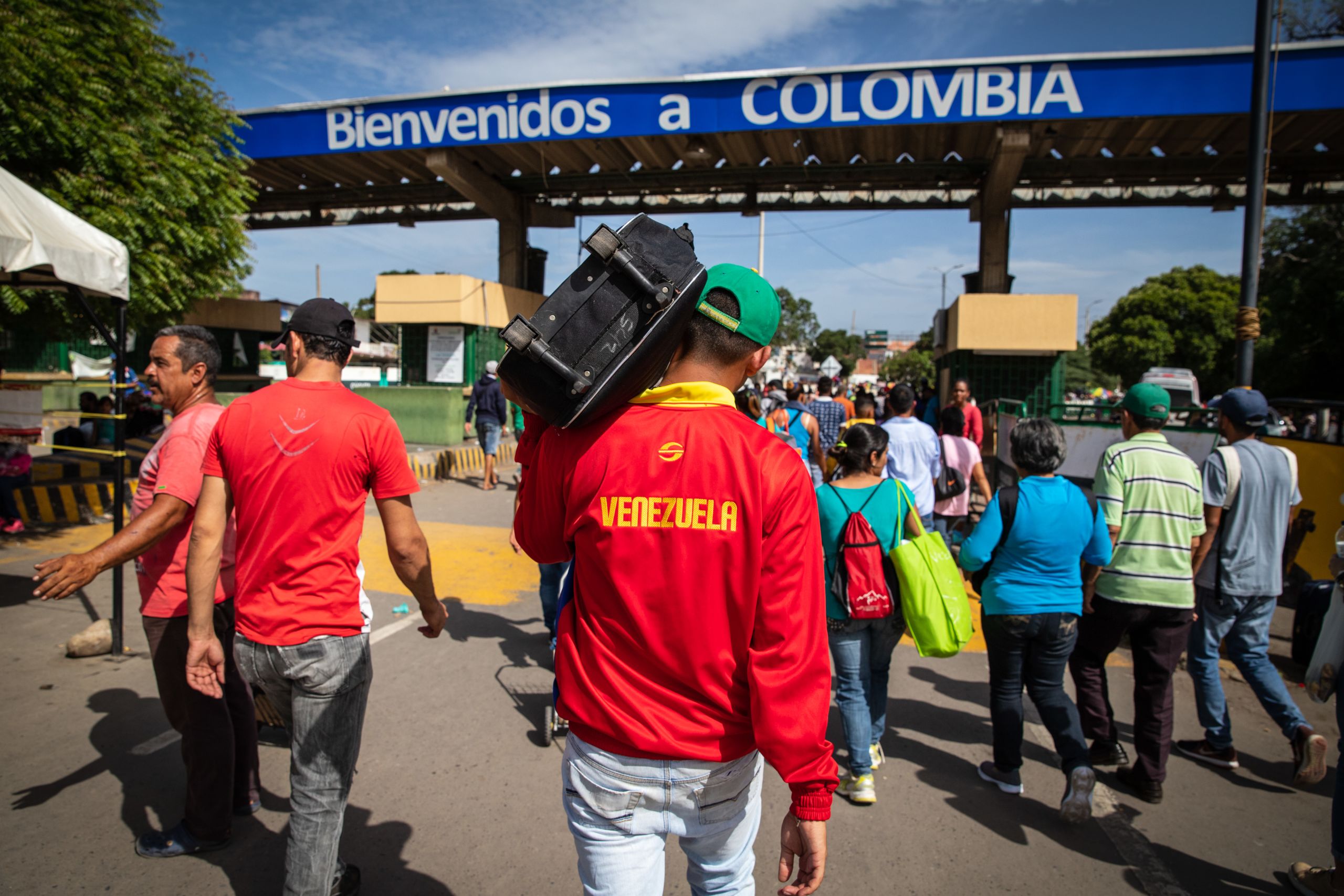
As thousands of Venezuelans were fleeing their country every day in January 2019, World Vision was mounting one of the largest humanitarian responses in its history. Two years later, our response has expanded to seven countries, including Venezuela, and reached more than 560,000 people with assistance in water, sanitation, and hygiene (WASH), child protection, health, food security, livelihoods, and education.
In two years, the economic and political turmoil in Venezuela has turned into a double-crisis as the wide-ranging effects of the coronavirus pandemic ravaged the region. Parents lost precious income and job opportunities, migrant families were evicted from their homes, and millions struggled to even find enough food to stay healthy.
These photos take us through some of the trials and triumphs of the past two years of our response to the Venezuela Crisis, as we work to bring hope in the midst of heartache.

A group of about ten Venezuelan migrants met in a shelter and decided to walk together for safety. They come from different parts of Venezuela. Some have been on the road for 18 days, others just joined today. Two of the children are under 6 months old. (©2019 World Vision/Photo by Jon Warren)
A group of about ten Venezuelan migrants met in a shelter and decided to walk together for safety. They come from different parts of Venezuela. Some have been on the road for 18 days, others just joined today. Two of the children are under 6 months old. (©2019 World Vision/Photo by Jon Warren)

Venezuelans emerge from the woods to ford the Tachira River and cross the border from Venezuela into Colombia near Cúcuta, in January 2019. On the Venezuela side, they pay a small fee to be allowed to pass on the trails. When the border is open, 35,000 to 45,000 people are estimated to cross over daily, most for work or to attend school. At that time in 2019, about 5,000 of them daily chose not to return to Venezuela. Instead, they try to find work in Colombia or move on to other neighboring countries. (©2019 World Vision/Photo by Jon Warren)
Venezuelans emerge from the woods to ford the Tachira River and cross the border from Venezuela into Colombia near Cúcuta, in January 2019. On the Venezuela side, they pay a small fee to be allowed to pass on the trails. When the border is open, 35,000 to 45,000 people are estimated to cross over daily, most for work or to attend school. At that time in 2019, about 5,000 of them daily chose not to return to Venezuela. Instead, they try to find work in Colombia or move on to other neighboring countries. (©2019 World Vision/Photo by Jon Warren)

A Venezuelan migrant woman who took her baby to a free clinic for Venezuelan migrants, fainted from hunger about a block from the clinic. World Vision staff, Mayerly Sanchez, held the baby, while Jorge Alejandro Castaneda, World Vision response manager, assisted the woman and called for help. She was escorted back to the clinic where staff gave her food and fluids and let her rest. She recently recovered from hepatitis. She is also breastfeeding and hadn't eaten all day. (©2019 World Vision/Photo by Jon Warren)
A Venezuelan migrant woman who took her baby to a free clinic for Venezuelan migrants, fainted from hunger about a block from the clinic. World Vision staff, Mayerly Sanchez, held the baby, while Jorge Alejandro Castaneda, World Vision response manager, assisted the woman and called for help. She was escorted back to the clinic where staff gave her food and fluids and let her rest. She recently recovered from hepatitis. She is also breastfeeding and hadn't eaten all day. (©2019 World Vision/Photo by Jon Warren)

A woman named Martha turned her house into a refuge for walkers fleeing the crisis in Venezuela. Here, a migrant family sleeps in Martha's house. By this point in April 2019, they were serving between 300 and 700 people daily with food, lodging and encouragement for their journey to Bucaramanga and beyond. (©2019 World Vision/Photo by Erica Bohorquez)
A woman named Martha turned her house into a refuge for walkers fleeing the crisis in Venezuela. Here, a migrant family sleeps in Martha's house. By this point in April 2019, they were serving between 300 and 700 people daily with food, lodging and encouragement for their journey to Bucaramanga and beyond. (©2019 World Vision/Photo by Erica Bohorquez)

Delores Vasquez and her sons tell their story of leaving Venezuela. Delores weeps as she tells of the challenges she faced in Venezuela, and how hard life is for her Colombia. They are recipients of World Vision's food voucher program in Cucuta, Colombia. (©2019 World Vision/Photo by Jon Warren)
Delores Vasquez and her sons tell their story of leaving Venezuela. Delores weeps as she tells of the challenges she faced in Venezuela, and how hard life is for her Colombia. They are recipients of World Vision's food voucher program in Cucuta, Colombia. (©2019 World Vision/Photo by Jon Warren)
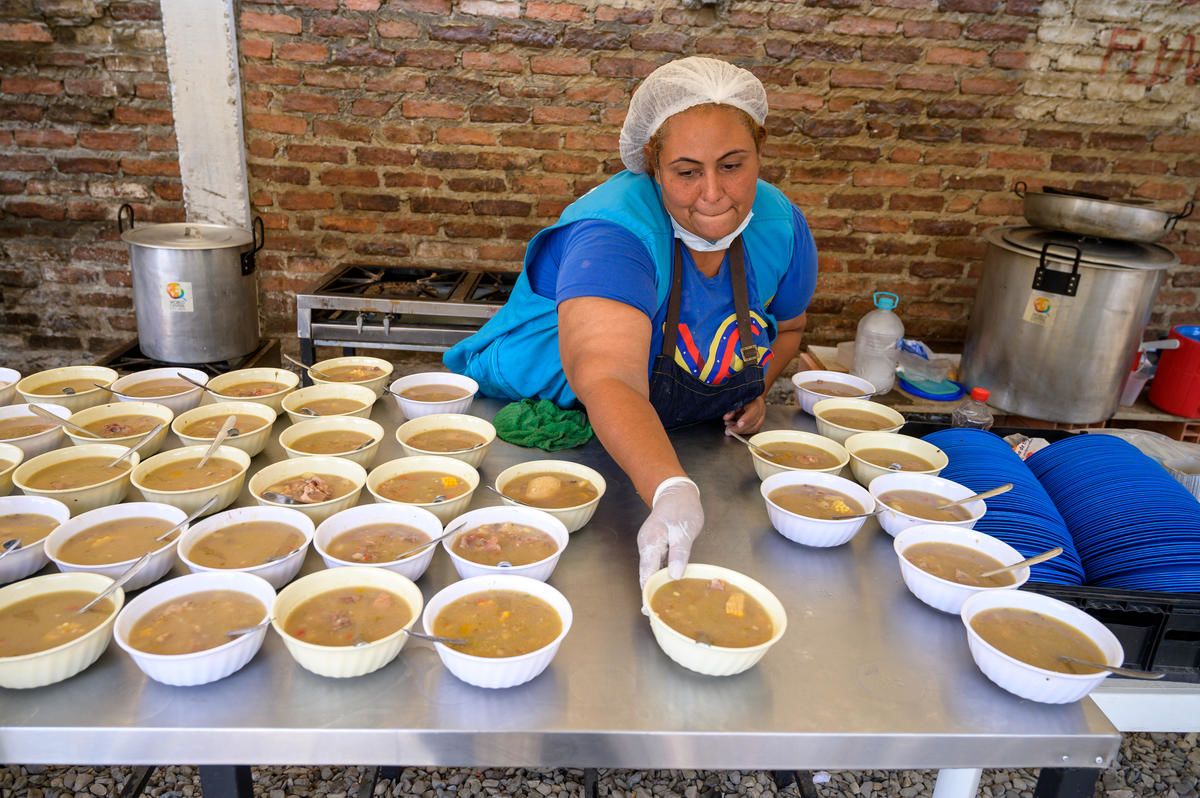
Heidi, a Venezuelan migrant who runs this soup kitchen with her husband, serves up bowls of hot soup for migrants coming through Cucuta, Colombia, in January 2019. World Vision has partnered with Fundacion de Venezolanos en Cucuta, which provides hot meals for breakfast and lunch and other services to migrants. The volunteer-run organization sometimes feeds 1,000 people a day. World Vision has helped provide staple foods that kitchen volunteers cook and serve. (©2019 World Vision/Photo by Jon Warren)
Heidi, a Venezuelan migrant who runs this soup kitchen with her husband, serves up bowls of hot soup for migrants coming through Cucuta, Colombia, in January 2019. World Vision has partnered with Fundacion de Venezolanos en Cucuta, which provides hot meals for breakfast and lunch and other services to migrants. The volunteer-run organization sometimes feeds 1,000 people a day. World Vision has helped provide staple foods that kitchen volunteers cook and serve. (©2019 World Vision/Photo by Jon Warren)

Hector Mendoza, 32, and his daughter, Josemeth, 1, eat at a World Vision-supported soup kitchen near the Colombia-Venezuela border. “I’ve been working in Colombia almost her whole life," Hector says. "The first six months after she was born, I was away working. I don’t want to be separated from her and my wife again. Our home is far away, about a 12-hour bus ride. I finally saved up enough money to buy bus tickets for us, but the bus broke down after six hours and we had to find another way to get here to the border.” (©2019 World Vision/Photo by Jon Warren)
Hector Mendoza, 32, and his daughter, Josemeth, 1, eat at a World Vision-supported soup kitchen near the Colombia-Venezuela border. “I’ve been working in Colombia almost her whole life," Hector says. "The first six months after she was born, I was away working. I don’t want to be separated from her and my wife again. Our home is far away, about a 12-hour bus ride. I finally saved up enough money to buy bus tickets for us, but the bus broke down after six hours and we had to find another way to get here to the border.” (©2019 World Vision/Photo by Jon Warren)

Venezuelan women learn how to make clothing and other products at a World Vision-funded sewing program at a Centro Cristiano church in Cucuta, Colombia. (©2019 World Vision/Photo by Jon Warren)
Venezuelan women learn how to make clothing and other products at a World Vision-funded sewing program at a Centro Cristiano church in Cucuta, Colombia. (©2019 World Vision/Photo by Jon Warren)

Children file into the Child-Friendly Space in the El Talento neighborhood of Cucuta, Colombia, where about 80% of the population are Venezuelan migrants. World Vision partnered with Centro Cristiano church to put a Child-Friendly Space on church property in the community. World Vision staff lead activities in the CFS tent several days a week for children from adjacent barrios. On Saturdays, the church leads enrichment activities for children, including music, dance, and reading. (©2019 World Vision/Photo by Jon Warren)
Children file into the Child-Friendly Space in the El Talento neighborhood of Cucuta, Colombia, where about 80% of the population are Venezuelan migrants. World Vision partnered with Centro Cristiano church to put a Child-Friendly Space on church property in the community. World Vision staff lead activities in the CFS tent several days a week for children from adjacent barrios. On Saturdays, the church leads enrichment activities for children, including music, dance, and reading. (©2019 World Vision/Photo by Jon Warren)

World Vision Child-Friendly Space coordinator, Henry Sandoval, helps Venezuelan migrant Sofia, 5, and other kids with their coloring at the World Vision CFS in the El Talento neighborhood in Cucuta, Colombia. (©2019 World Vision/Photo by Jon Warren)
World Vision Child-Friendly Space coordinator, Henry Sandoval, helps Venezuelan migrant Sofia, 5, and other kids with their coloring at the World Vision CFS in the El Talento neighborhood in Cucuta, Colombia. (©2019 World Vision/Photo by Jon Warren)

A woman feeds her baby at Esperanza de Jesus II feeding center in north Lima, Peru in March 2020, just a week before most Latin American countries closed their borders and instituted national stay-at-home orders to prevent the spread of the coronavirus. This feeding center is just one example of the good that comes when donors like USAID provide resources to organizations like World Vision to empower local service organizations like the Esperanza de Jesus II feeding center. Between July 2019 and February 2020, World Vision Peru and Care Peru helped 27 feeding centers make 151,200 hot meals to feed 8,567 people and provided USD$2 million in cash transfers to 26,682 Venezuelans and Peruvians through the “Reduciendo la vulnerabilidad de los migrantes y refugiados venezolanos en Perú” project. In total, the USAID-funded project reached 35,579 people. (©2020 World Vision/Photo by Chris Huber)
A woman feeds her baby at Esperanza de Jesus II feeding center in north Lima, Peru in March 2020, just a week before most Latin American countries closed their borders and instituted national stay-at-home orders to prevent the spread of the coronavirus. This feeding center is just one example of the good that comes when donors like USAID provide resources to organizations like World Vision to empower local service organizations like the Esperanza de Jesus II feeding center. Between July 2019 and February 2020, World Vision Peru and Care Peru helped 27 feeding centers make 151,200 hot meals to feed 8,567 people and provided USD$2 million in cash transfers to 26,682 Venezuelans and Peruvians through the “Reduciendo la vulnerabilidad de los migrantes y refugiados venezolanos en Perú” project. In total, the USAID-funded project reached 35,579 people. (©2020 World Vision/Photo by Chris Huber)

Aid workers delivered cash cards to Venezuelan migrant families to help them purchase badly-needed food and other necessities during quarantine, as part of World Vision Ecuador’s COVID-19 emergency response in April 2020 in Manta. The cards can be used at a variety of stories locally. (©2020 World Vision/Photo by Chris Huber)
Aid workers delivered cash cards to Venezuelan migrant families to help them purchase badly-needed food and other necessities during quarantine, as part of World Vision Ecuador’s COVID-19 emergency response in April 2020 in Manta. The cards can be used at a variety of stories locally. (©2020 World Vision/Photo by Chris Huber)

Isai, 8, right, David, 6, and Yonailys, 3, do homework and activities on their bed at home on the edge of south Quito, Ecuador. Their family arrived in Ecuador in December 2019, after a short stay in Peru. They weren't able to settle there because their parents couldn´t find work. David and Yonailys were able to enroll in local schools, but Isaí couldn't because he had not attended any school before and did not have his documents. The pandemic forced Joselinel, their mother, and Elizabeth, their grandmother, to become the children's teachers, even though they struggled to make ends meet and afford school supplies. (©2020 World Vision/Photo by Chris Huber)
Isai, 8, right, David, 6, and Yonailys, 3, do homework and activities on their bed at home on the edge of south Quito, Ecuador. Their family arrived in Ecuador in December 2019, after a short stay in Peru. They weren't able to settle there because their parents couldn´t find work. David and Yonailys were able to enroll in local schools, but Isaí couldn't because he had not attended any school before and did not have his documents. The pandemic forced Joselinel, their mother, and Elizabeth, their grandmother, to become the children's teachers, even though they struggled to make ends meet and afford school supplies. (©2020 World Vision/Photo by Chris Huber)

Reishell, 7, with her mother, Amalia, 26, her father, Elio, 29, and her brother, Aiden, 3, at their apartment in Quito, Ecuador in mid-2020. They have lived in Quito since fleeing malnutrition and poverty in Venezuela in late 2018. During the time of confinement she missed her friend, Isabelita, and her teacher, Lucia, the most. She lost all contact with her school because her only means of communication is the family's cell phone, which was suspended because her parents couldn't pay the bill. As the prevention measures eased and society opened up, Reishell's parents found more work and things gradually improved. Life is still a daily struggle for them. (©2020 World Vision/Photo by Chris Huber)
Reishell, 7, with her mother, Amalia, 26, her father, Elio, 29, and her brother, Aiden, 3, at their apartment in Quito, Ecuador in mid-2020. They have lived in Quito since fleeing malnutrition and poverty in Venezuela in late 2018. During the time of confinement she missed her friend, Isabelita, and her teacher, Lucia, the most. She lost all contact with her school because her only means of communication is the family's cell phone, which was suspended because her parents couldn't pay the bill. As the prevention measures eased and society opened up, Reishell's parents found more work and things gradually improved. Life is still a daily struggle for them. (©2020 World Vision/Photo by Chris Huber)

Venezuelan migrants try to catch a ride on a truck to cross Venezuela's border into Colombia near the northern city of Cucuta, Colombia. They were embarking on a long journey searching for a better future. (©2019 World Vision/Photo by Erica Bohorquez)
Venezuelan migrants try to catch a ride on a truck to cross Venezuela's border into Colombia near the northern city of Cucuta, Colombia. They were embarking on a long journey searching for a better future. (©2019 World Vision/Photo by Erica Bohorquez)

Two young girls carry jugs full of water they collected at a source in late 2020 near their home Miranda state, Venezuela. The double-crisis of economic collapse and COVID-19 in Venezuela have taken their toll on the family. They struggle daily to find enough to eat, collect clean water, and afford medical bills. They live with their mother, four siblings, and one nephew in a tiny one-room apartment. (©2020 World Vision/Photo by Edward Scholtz)
Two young girls carry jugs full of water they collected at a source in late 2020 near their home Miranda state, Venezuela. The double-crisis of economic collapse and COVID-19 in Venezuela have taken their toll on the family. They struggle daily to find enough to eat, collect clean water, and afford medical bills. They live with their mother, four siblings, and one nephew in a tiny one-room apartment. (©2020 World Vision/Photo by Edward Scholtz)
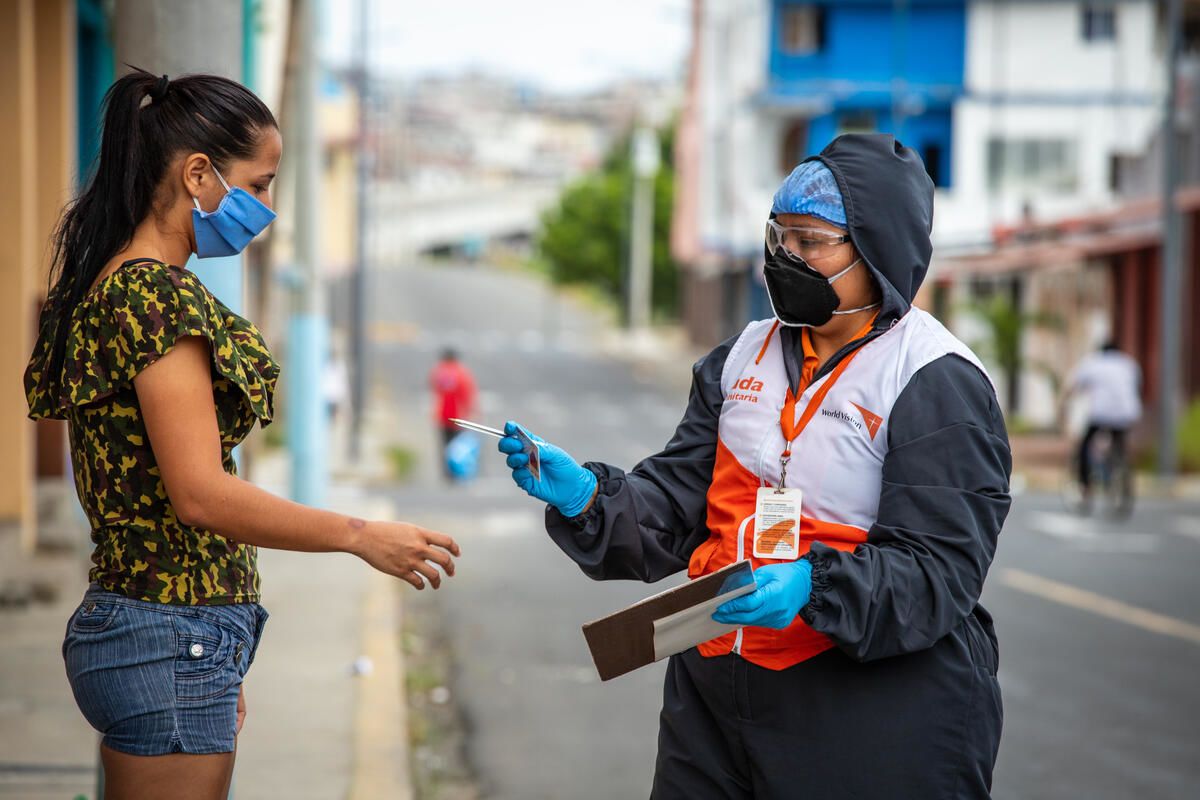
World Vision staff member Patricia Rojas, orange and white vest, distributes cash cards to Venezuelan migrant families who are struggling to afford basic necessities because they are out of work and stuck at home during the COVID-19 quarantine in April 2020 in Manta, Ecuador. (©2020 World Vision/Photo by Chris Huber)
World Vision staff member Patricia Rojas, orange and white vest, distributes cash cards to Venezuelan migrant families who are struggling to afford basic necessities because they are out of work and stuck at home during the COVID-19 quarantine in April 2020 in Manta, Ecuador. (©2020 World Vision/Photo by Chris Huber)
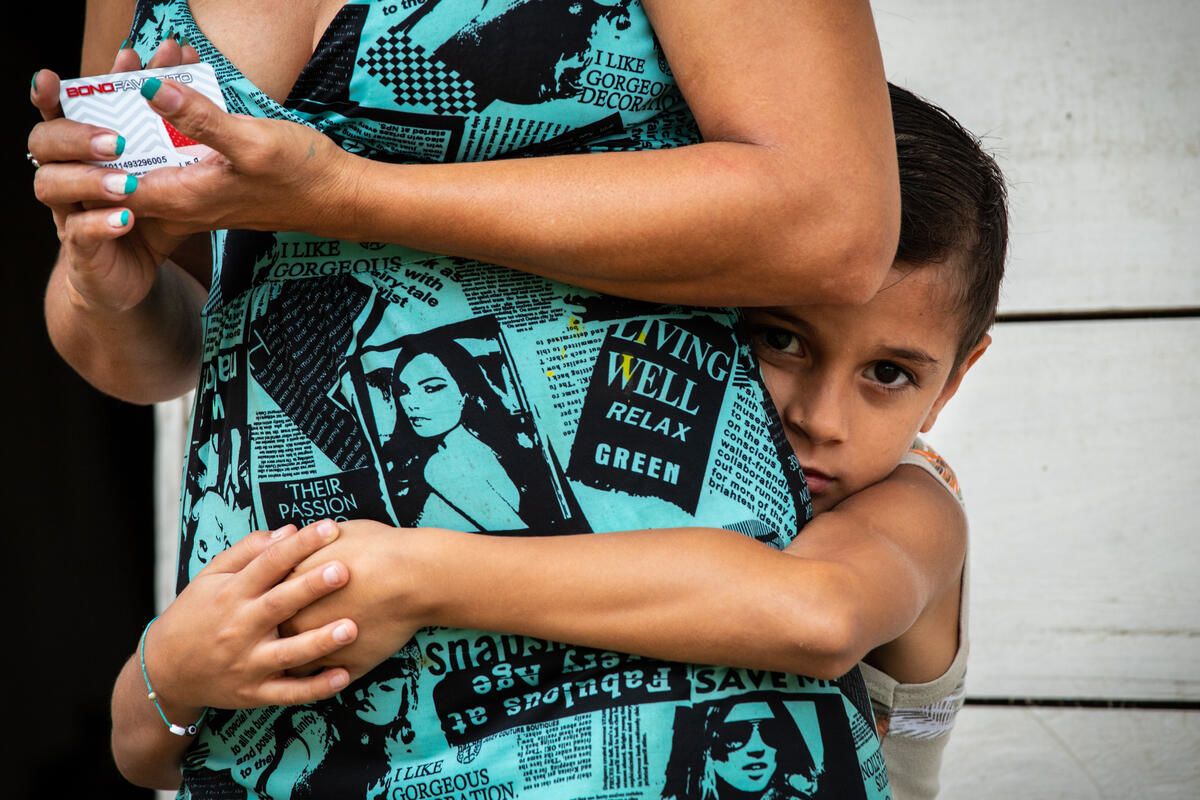
Ángel embraces his mother, Katiuska, as she talks with visitors. In April 2020, World Vision staff distributed gift cards to help struggling Venezuelan migrant families get through the tough economic times brought on by measures imposed to reduce the spread of coronavirus. (©2020 World Vision/Photo by Chris Huber)
Ángel embraces his mother, Katiuska, as she talks with visitors. In April 2020, World Vision staff distributed gift cards to help struggling Venezuelan migrant families get through the tough economic times brought on by measures imposed to reduce the spread of coronavirus. (©2020 World Vision/Photo by Chris Huber)
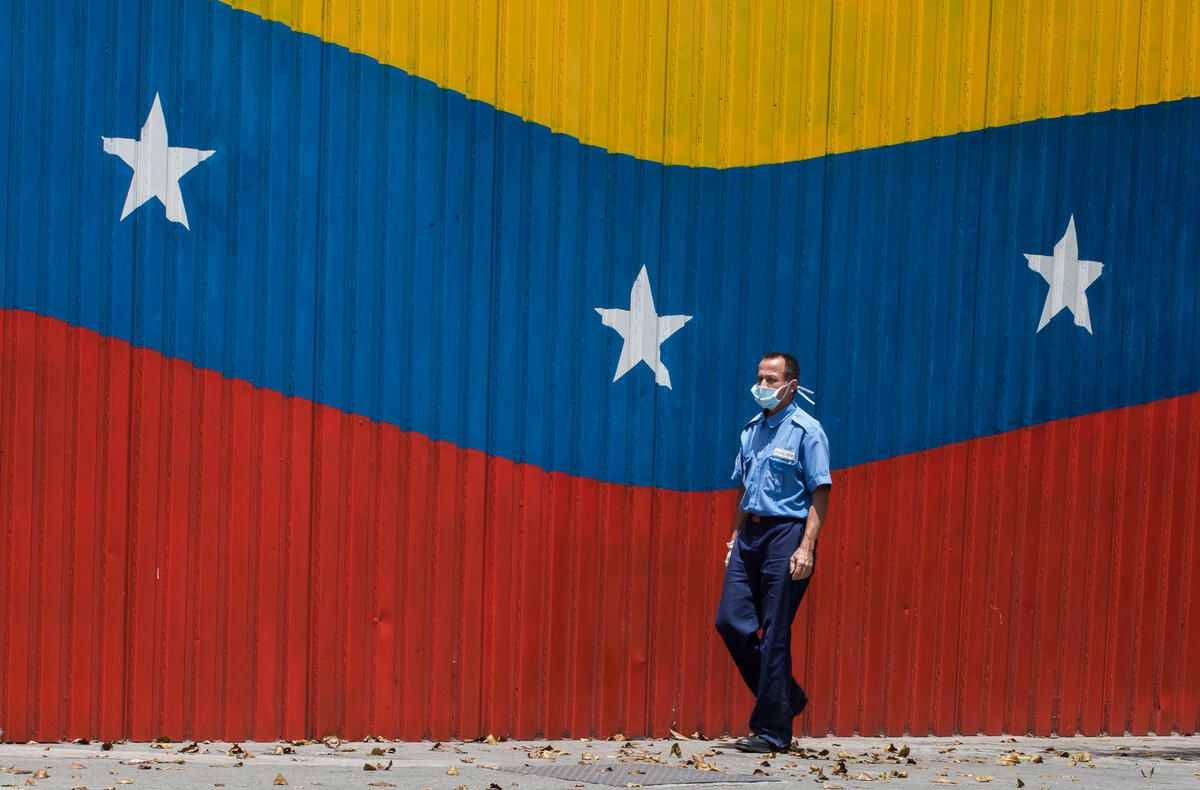
As the restrictive COVID-19 prevention measures set in across the world in March and April, a man wearing a mask walks past a Venezuelan flag painted on a wall in the capital city of Caracas. The double-crisis continues to make life extremely difficult for millions of Venezuelans and host communities throughout the region. But the humanitarian response is helping people remain hopeful for a better future. (©2020 World Vision/Photo by Alberto Gulín)
As the restrictive COVID-19 prevention measures set in across the world in March and April, a man wearing a mask walks past a Venezuelan flag painted on a wall in the capital city of Caracas. The double-crisis continues to make life extremely difficult for millions of Venezuelans and host communities throughout the region. But the humanitarian response is helping people remain hopeful for a better future. (©2020 World Vision/Photo by Alberto Gulín)
